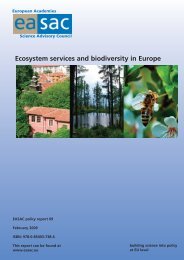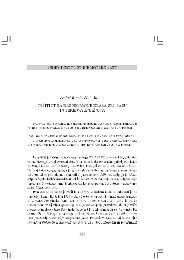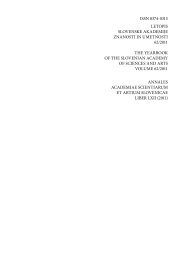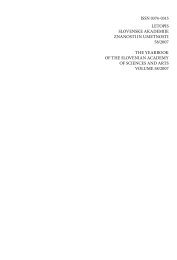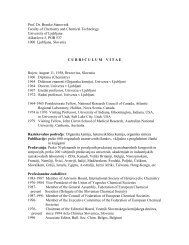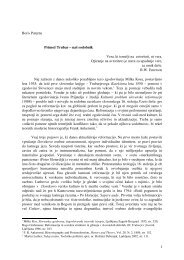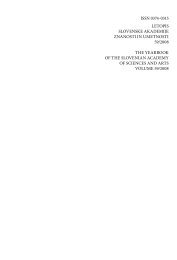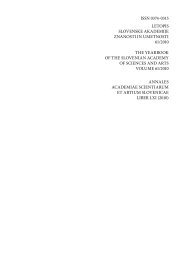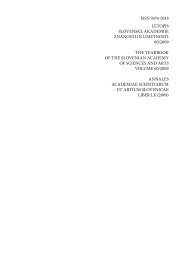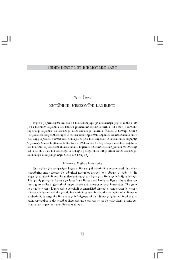Taking Inquiry-Based Science Education into Secondary ... - SAZU
Taking Inquiry-Based Science Education into Secondary ... - SAZU
Taking Inquiry-Based Science Education into Secondary ... - SAZU
Create successful ePaper yourself
Turn your PDF publications into a flip-book with our unique Google optimized e-Paper software.
16<br />
<strong>Taking</strong> IBSE <strong>into</strong> <strong>Secondary</strong> <strong>Education</strong><br />
it provides no extended periods where students can study topics in depth or engage in problem-finding,<br />
problem-solving and reflection. A series of short lessons may suit methods aimed at memorisation, but not<br />
inquiry-based teaching. What is needed – and it should not be too difficult to arrange given the will – is for<br />
science to be scheduled in 2 or 3 consecutive lesson, allowing the teacher to use this time for extended<br />
inquiries on a regular basis. Arrangements of this kind were described in her conference presentation<br />
by Shuler as an example of best practice in secondary science education. In a school for science and<br />
technology in Virginia, the class schedule for four days of the week was divided not <strong>into</strong> the usual eight<br />
periods of 45 minutes a day, but only <strong>into</strong> four periods of 90 minutes.<br />
This may not be feasible in schools which do not focus on science and technology but since there are other<br />
subjects which could benefit from longer blocks of time it ought to be possible to arrange for all students<br />
to have opportunities for sustained inquiries on sevejral occasions during the school year. For instance, the<br />
timetable could be suspended for several days each half semester, to allow students, in groups supported<br />
by teams of teachers, to work on long-term projects that can be continued if appropriate throughout the<br />
year. The experience of teamwork among students is itself an important feature of learning about the nature<br />
of scientific activity and longer periods of time enable them to become more engaged, creative and reflective<br />
in their activities.<br />
5.5 Assessment and testing<br />
Among the several factors that can influence teaching methods, by far the greatest influence comes from<br />
the forms of student assessment that are used. All assessment will influence what is taught and how it is<br />
taught to some extent. Indeed this is one of the intentions of formative assessment and why it has a key<br />
role in helping learning, providing feedback to the teacher and student to inform the pace and next steps<br />
of learning.<br />
5.5.1 Formative assessment<br />
Formative assessment, or ‘assessment for learning’, as it is also called, engages students in their own<br />
learning through a cyclical process in which information about students’ ideas and skills informs on-going<br />
teaching. It involves the collection of evidence about learning as it takes place, the interpretation of that<br />
evidence in terms of progress towards the goals of the work, the identification of appropriate next steps and<br />
decisions about how to take them. It is an essential part of inquiry, helping to regulate teaching and learning<br />
processes to ensure progression in learning with understanding. It is also central to enabling students to<br />
acquire ownership of their learning, one of the key features of genuine understanding. Ownership requires<br />
that students know the goals of their work and the quality criteria to be applied so that they can themselves<br />
assess where they are in relation to the goals. This puts them in a position to identify, with their teachers,<br />
the next steps in their learning and to take some responsibility for progress towards the goals.<br />
Assessment only has a formative role if the information gained is used, which means that teachers have<br />
to be prepared to adapt their teaching accordingly. Introducing formative assessment is likely to require a<br />
considerable change in pedagogy, just as in the case of inquiry-based teaching. Indeed, full implementation<br />
of inquiry involves the use of formative assessment so that information is gathered about relevant aspects of<br />
students’ learning processes and achievements. The aims of inquiry-based teaching and formative assessment<br />
also coincide in helping students to take some responsibility for their learning, requiring teachers to<br />
have the confidence to give some control to students.<br />
<strong>Secondary</strong> teachers have less time to get to know their students than do primary teachers, although their<br />
more mature students are more readily engaged in discussing the goals and criteria for judging quality. Both<br />
primary and secondary teachers, however, need help in the form of well-tried strategies which they and<br />
Report on the conference, York, UK, October 27-29 2010



